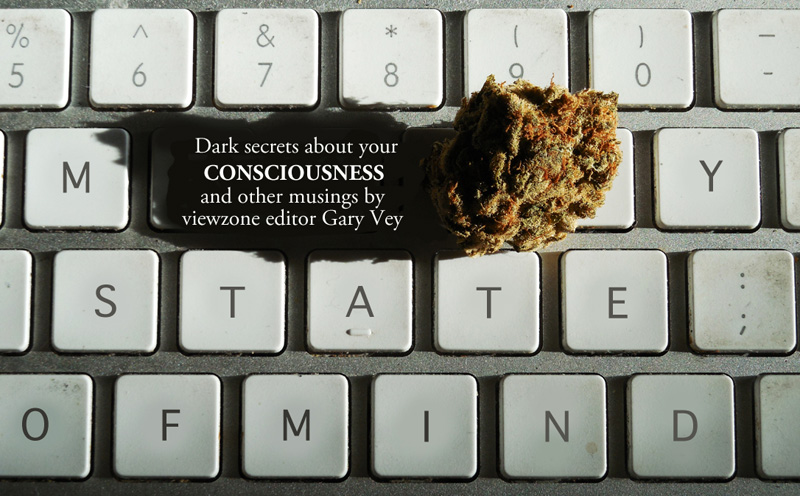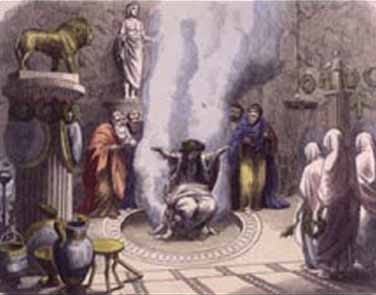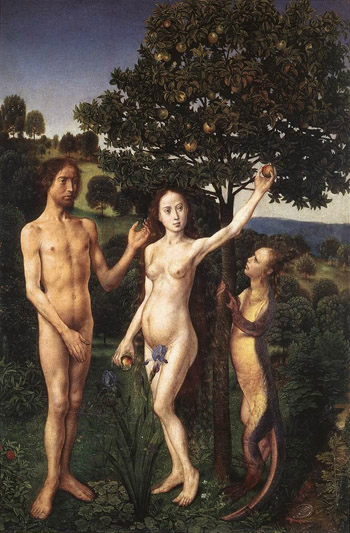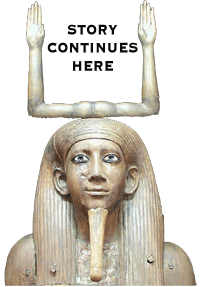
-- Julian Jaynes
Oracles, Shaman and Hypnosis
Before I summarize what we've been discussing on the past few pages, I'd like to mention how the bicameral voice tried to survive during the transitioning era when most men did not hear it.
 There arose among the population certain individuals who were capable of being possessed by various gods' voices. These special people were much in demand and were known as oracles, Sybils, and shaman. They went into their trance state and usually transmitted answers to questions put to them by kings, military rulers and other prestigious people who needed supernatural guidance.
There arose among the population certain individuals who were capable of being possessed by various gods' voices. These special people were much in demand and were known as oracles, Sybils, and shaman. They went into their trance state and usually transmitted answers to questions put to them by kings, military rulers and other prestigious people who needed supernatural guidance.
Jaynes gives some examples and notes that their response to questions was always immediate and usually recited in a kind of poetry or prose, instantly composed. The advice was usually accepted as coming from the god and was the basis of numerous wars, campaigns and peace agreements among the advice seekers of the day.
In more isolated cultures, shaman often use psychedelic plants to temporarily disintegrate the subjective "I" and trained themselves to receive the wisdom of the old bicameral voice.
Most of these seers were from ordinary backgrounds, simple people, who were recognized for their abilities to hear voices in their youth. They remained isolated from the world, uncontaminated by the dark sides of consciousness.
Jaynes lists four things that are necessary for a conscious mind to contact the voice and be possessed by it:
- 1: The collective cognitive imperative or belief system, a culturally agreed upon expectancy or prescription which defines the particular form of the phenomenon, the roles to be acted out, and the expectations of the act.
- 2: The induction or formally ritualized procedure whose function is to narrow the focus of attention on a small range of possibilities. This could be exhibited in strange clothing, strange un-worldly music or rhythms, drugs, smoke, dancing...
- 3: The trance itself which is in response to the preceding factors, diminishing the subjective "I" and resulting in a role that is accepted by the group. This is often accompanied by writhing and bodily contortions as the Right Hemisphere tries to take control of the movement. The subject usually goes unconscious.
- 4: The Archaic authorization to which the trance is directed... usually to connect with a god but sometimes also with the person who is accepted to be the authority figure and is responsible for control of the trance tate. This can be the personal god of the entranced person, a spirit, animal or a hypnotist.
Jaynes notes these four points compensate for each other. When there is less induction there will be more authority and so on. Here, let him explain.
"There is a kind of balance or summation among these elements, such as when one of them is weak the others must be strong for the phenomenon to occur. Thus, as through time, particularly in the millennium following the beginning of consciousness, the collective cognitive imperative becomes weaker (that is, the general population tends toward skepticism about archaic authorization), we find a rising emphasis on and complication of the induction procedures, as well as the trance state itself bceoming more profound." -- Jaynes
We can see this operational in many trance phenomenon today where the culture promotes being possessed by a spirit or spirits. Religions in Haiti and Brazil are good examples. Usually the trance is induced by rhythmic drum beating and dancing. The individual taken over by a spirit is usually unconscious while the message is delivered in their own voice or the spirit's voice.
Hypnosis
In hypnosis, we see the same procedures. The hypnotist has a defined role and the expectations of hypnosis are well known (1); attention is then focused on some small object or movement of a pendelum ("Keep your eyes on the pendulum as it moves back and forth...") (2); the trance is then suggested ("You are getting more and more tired but you continue to hear the sound of my voice...") often with some type of steps or graduation of trance involved ("You are going down some stairs and getting more deeply asleep with each step...") (3); and finally the hypnotist assumes the role of the authority and gives the suggestions ("You will do exactly what I say...")(4).
The same steps, used by a skilled professional, can hack into our personal narrative and give orders or suggestions and achieve some amazing results. I include here a Youtube video of the famous mentalist, Derren Brown, who uses his skills at a local dog track.
In this case the women working in the ticket booths are already focused and in a kind of trance state by the environment and their repetitive jobs. Their focus on the world is severely limited in the booth. While there is no collective cognitive imperative for what Derren Brown does (after all, it is illegal) his archaic authorization is dramatic and compensates for this as he takes over the inner narrative and changes the women's reality.
This is a vestige of our bicameral mind.
Don't get any ideas from this...
To Summarize
This is a good place to stop and review what Jaynes has discovered and the examples I have provided. If you have been following this story then you no doubt have come to some conclusions yourself about the nature and origin of the bicameral voice, the voice of the gods and the voice of the prophets.
Lets try to digest this.
Most of our thinking, decision making, judgements and morality takes place in a part of our mind that is not immediately accessible to our consciousness, which is apparently the last stop in the flow of information.
Bicameral man's mind was devoid of an idea of self, or of having a subjective "I". Volition and free-will were in the form of habitual routines, punctuated by audio hallucinations from the non-dominant Right Hemisphere. This was the bicameral voice. These pronouncements were always obeyed without hesitation and proved to be highly intelligent and resourceful enough to guide ancient humans through 40,000+ of the most challenging years of evolution to the present time.
The bicameral voices began with the development of language, which includes all modes of communication, but especially the spoken word. It was the motivation for group projects and it defined daily conduct. The bicameral voice began to decline as writing was invented. The voice was no longer required as the guidance was recorded in text and became "law".
Early human civilization was modeled around a chief, god or king who resided in a special central location where people could see and "hear" his authority. His voice became the bicameral voice. As cultures began to live together, people had their own family and tribal gods to whom they offered votives and sought prosperity. Idols and fetishes could trigger the hallucinated voice on sight. To bicameral man, the gods really did speak and so were very real.
As language grew in vocabulary, new ideas could more easily be described and absorbed. When these ideas were written down, they could be shared across geography and time. This was the beginning of scholarship and the decline of the bicameral era. The dependance on the bicameral voice became less important. Written laws or proclamations of the gods did not need the bicameral voice for which the brain was hard-wired to obey. This allowed man to create his own inner voice and consciousness was born.
An interesting span of history, from which we are still suffering the consequences, happens during the transition from bicameral to conscious mankind (about 1500BCE to 900 BCE). To maintain order and with nostalgia for the silent bicameral voice, conscious man creates a new voice that is motivated by his own needs and wants. This new voice is capable of anger, pride, murder, vengeance and jealousy. This new voice is called Yahweh.
The Yahweh voice is first heard by conscious man. Later it gets inside man's mind and possesses it, shutting off his consciousness and using his own voice to proclaim the will of Yahweh. This possession is usually involuntary, painful, immoral and deceitful. When it is benevolent, it is only to the descendants of the Biblical Isaac -- the begotten son of Yahweh and Sarah.
The Garden of Eden
Now that you have struggled through a dozen pages to understand Julian Jaynes' theory, or rather discovery, let's imagine that you want to convey this idea to people hundreds of years ago, before there was an understanding of psychology or the anatomy of the brain -- before we had brain scans and did experiments with animals...
Those individuals or families that somehow attained consciousness undoubtedly recognized that they were different from the others around them. While consciousness faded in and out of history perhaps there was an attempt to describe what had happened, hidden in some story that could easily be passed along orally. It's true meaning might be hidden and only realized later, when the subtle clues could be recognized in light of a deeper understanding of things.
 I think there is enough evidence to suggest that the story of Adam and Eve might be a story about the emergence of consciousness. And if this is true, there might be some clues as to the identity of the bicameral voice and the voice of Yahweh.
I think there is enough evidence to suggest that the story of Adam and Eve might be a story about the emergence of consciousness. And if this is true, there might be some clues as to the identity of the bicameral voice and the voice of Yahweh.
First, the tree is a very old and well known symbol of scopophilia. Climbing a tree gives one a better view of things, a better understanding of the environment and where we are. So the tree provides a hint that this epic is about the mind and awareness.
We next have two individuals, male and female, who are living in an ideal condition with everything they need provided to them by a benevolent voice that speaks to them. The voice gives guidance and sustains them but it has warned that there is one "tree", the fruit of which they must not eat, lest they die. This is described as the "knowledge of good and evil."
"You must not eat the fruit from the tree in the middle of the garden. Do not even touch it. If you do, you will die." -- Genesis 3
It must be obvious by now that before man achieved consciousness his volition was the bicameral voice. Since he always obeyed the voice his actions were exempt from sin. It was not possible for bicameral man to sin because he was incapable of deception, pride, jealousy, shame, hatred, love... all of these require the subjective "I" of consciousness.
When man achieved consciousness all that changed. Now man could know the instructions of the bicameral voice but he had the choice to obey or to pursue his own inner voice. For the first time, man was capable of being aware of himself and the consequences of his actions. Man had achieved the knowledge of good and evil.
It's a good idea to look at the text now, in light of what we know about the brain and how it works.
We have already seen that the brain has two hemispheres. The Right Hemisphere (in right handed people) controls the left side of the body (eyes, ears, movement etc.) and is decisively female in traits. This is also the hemisphere where the bicameral voice resided and originated. This was Eve.
The Left Hemisphere, where most of our control centers and language abilities are located, is described as being masculine. It follows orders from its twin hemisphere in bicameral man, usually without hesitation. After consciousness, the Left Hemisphere doesn't have the guidance from its twin and it substitutes its own internal voice.
The "temptation" was that:
"God knows that when you eat fruit from that tree, you will know things you have never known before. Like God, you will be able to tell the difference between good and evil." [ibid]
And so the female -- the Right Hemisphere -- initiated the act that was suggested to her by a different voice, symbolized by the serpent. And after this act, Adam -- the Left Hemisphere -- also became involved.
"The woman saw that the tree's fruit was good to eat and pleasing to look at. She also saw that it would make a person wise. So she took some of the fruit and ate it. She also gave some to her husband, who was with her. And he ate it. Then both of them knew things they had never known before. They realized they were naked. So they sewed together fig leaves and made clothes for themselves." [ibid]
The effect of consciousness was immediate. They became aware of how others viewed them (Theory of Mind) and were ashamed of their nakedness. They had attained a subjective "I".
When the voice of the garden called to them -- the bicameral voice -- they did not answer immediately and hid (deception). When confronted they said they hid because of their nakedness.
"The Lord God said, 'Who told you that you were naked? Have you eaten fruit from the tree I commanded you not to eat from?'" [ibid]
Fear of death

One of the many down sides to consciousness is the fact that we can imagine our own death -- the annihilation of the self. I've written about this already HERE. In psychology, this is called the Terror Management Theory.
Terror Management Theory (TMT) states that all human behavior is motivated by the fear of our own mortality. The fact that you and I will eventually die and be "no more" is a fact known and understood only by conscious humans. Although animals have an avoidance of death, they live in the present. They don't comprehend their destiny. Only humans have the capacity to project reality in time and imagine the future. Only humans realize the significance of the subjective "I" being "no more".
The theory originated with anthropologist Ernest Becker's 1973 Pulitzer Prize-winning work of nonfiction, The Denial of Death, in which Becker argues:
"All human action is taken to ignore or avoid the anxiety generated by the inevitability of death."
The terror associated with our unstoppable annihilation creates a subconscious conflict or anxiety called cognitive dissonance. We try to cope with having to accept two contrary ideas. On one hand, we want to become involved with life and think of ourselves as a meaningful part of the world. On the other hand, what does anything matter anyway if we ultimately become "no more" -- if all this wonderment of life is temporary?
This is perhaps what was meant by the warning, The day you eat of it you will die.
Throughout history, the serpent who tempted Eve is considered the symbol for an entity that opposes the bicameral voice, the antithesis of the benevolent provider of humanity, known by many different names (the devil, satan, lucifer, the Evil One...).
According to some esoteric writers,
"Satan then was arguably a divine being destined to carry light and life to the nether world. He stands for the gift of free will and self conscious mind to man, a point which at once seduces and uplifts man, for with free will does the power to go astray. Satan is therefore man's teacher."
--Lucifer Theosophy Magazine
And according to Sanat Kumara, of The Masters of Wisdom cult,
"Satan is the promethium being who gave mankind the fire of self-consciousness and independent, individual selfhood." -- [ibid]
The story of Adam and Eve was also mentioned in Jaynes' book. He also suggested that one should read two Biblical books which were composed right at the era where the big change took place. Let me just mention them.
The Book of Amos was written about 1200 BCE. It is real bicameral stuff. Every passage begins with, "The Lord said..." and recites the instructions of the bicameral voice. There is no hint of personal feelings, internal thinking or anything suggestive of a subjective "I".
Ecclesiates on the other hand, written about 300 BCE, is full of emotion and contemplation and even mentions internal dialog:
"I said to myself, 'God will bring into judgment both the righteous and the wicked, for there will be a time for every activity, a time to judge every deed.'" --Ecclesiastes 3:7
And the well known verse which mentions death as a part of life:
"There is an appointed time for everything. And there is a time for every event under heaven -- A time to give birth and a time to die; A time to plant and a time to uproot what is planted... [3:1]
It goes without saying that the later teachings and life of Jesus (circa 34 AD) was entirely geared towards promoting the use of consciousness to love and act with compassion. Jesus also offered man a personal and loving god (i.e. "The Father") instead of a heartless, narcissistic, tribal law-maker called Yahweh.
What will follow are my own ideas and theories about what has happened to us, is happening to us and perhaps some ways of using this new insight to get back to the garden.
